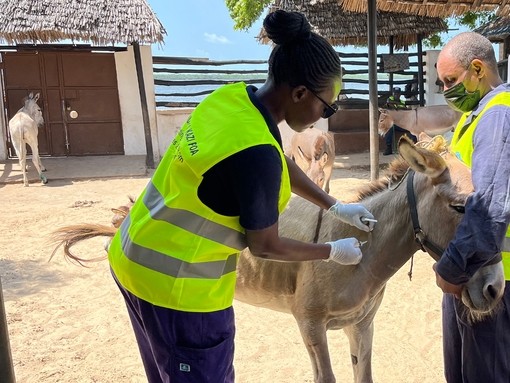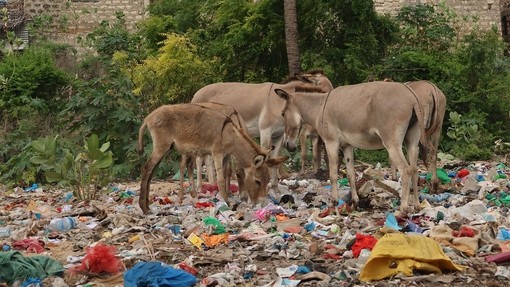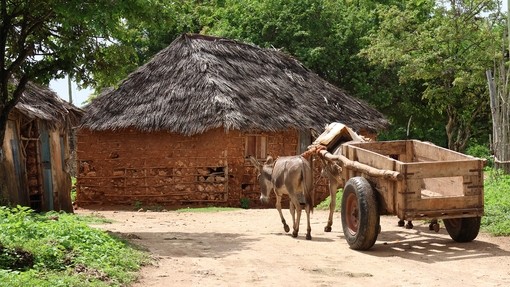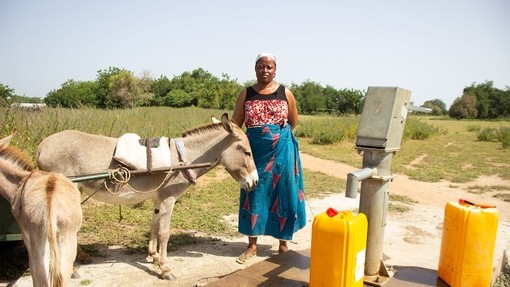
World Rabies Day 2024
Rabies is one of the world’s most dangerous and deadly diseases, although it is entirely preventable through vaccination. More often associated with dogs than donkeys, the infectious viral disease can be contracted by any warm-blooded mammal when infected saliva comes into contact with an open wound.
By collaborating with local government agencies and partner organisations, we are supporting vaccination programmes in two key communities that rely on donkeys for their livelihoods - one in the Lamu archipelago in East Africa, and one in the southern Mexican state of Oaxaca.
Vaccinating donkeys and dogs in Kenya
Companion animals, such as dogs, are likely to be a cause of transmission and that’s why in Lamu, The Donkey Sanctuary has taken steps to include them in the vaccination programme. Vaccinating dogs helps to protect donkeys and humans too, and increases the chance of eliminating the disease which will ultimately save more lives.
Located on the waterfront in Lamu Old Town on Lamu Island, The Donkey Sanctuary’s clinic has been providing free of charge support to donkeys and the surrounding communities that rely upon them for more than 35 years. To drive traffic on the day of vaccinations, a local Town Crier took to the streets with a loudspeaker to announce the free service to people around the town.
The vaccination team in Kenya vaccinated just under 1,800 donkeys and over 2,500 dogs in several locations across the Lamu archipelago during a period of six weeks, which started in May. Lamu donkeys were also vaccinated against tetanus at the same time, as cases of this disease in donkeys has seen an increase over the past few years.

Reaching 50,000 donkeys in Mexico
Meanwhile in Mexico, The Donkey Sanctuary is working with local partners, led by the State Committees for the Promotion and Protection of Livestock of each participating state, who are focusing on areas where marginalised donkey owning communities are exposed to the presence of high rates of rabies. The programme in Oaxaca, which ran for nine months in 2022 and is currently running in other regions within the state, has vaccinated 4,000 donkeys against rabies to date. In 2024, regions in the state of San Luis Potosi will also be incorporated, and there are proposals to include some regions in the states of Hidalgo in 2025.
Through this activity, the programme in Mexico plans to reach an additional 4,000 donkeys before the summer of 2025. Over the course of the five-year implementation it is estimated that these projects will reach somewhere in the vicinity of 50,000 donkeys directly through this collaborative work.
Although the transmission of rabies to humans from domestic dogs has been eradicated in Mexico since 2019, the latest data shows confirmed cases of paralytic rabies in a variety of animal species in 26 of the 32 states. Considering that the country has a strong reservoir of rabies in wildlife, especially in bat populations, it is clear that rabies is more widespread. Therefore awareness-driving campaigns are also running in tandem to call for donkeys to be included in the government vaccination agenda.

“What saves animals, will save humans too”
Rebekah Sullivan, who travelled to Lamu to support with the vaccination campaign, explains: “This visit was a fascinating insight into the activities of the clinic, and an opportunity to see our rabies and tetanus vaccination campaign first hand and workshop the next stages of the programme’s development.
“With a fatality rate of almost 100 per cent in humans and animals alike, rabies remains a global threat in donkey-reliant communities like Lamu and Oaxaca. There is no cure, so prevention is vital, which is why our programme and a ‘one welfare’ approach works to vaccinate not just donkeys, but companion animals such as dogs, which transmit the disease.
“We know that what saves animals, will save humans too.”
Dr Solomon Onyango, Country Director for The Donkey Sanctuary in Kenya, said: “Donkeys are the bread winners for many families in Lamu, and in Kenya as a whole.
“This calls for communities, the government, and both humanitarian and animal welfare organisations to be proactive and work together to ensure that we control and eradicate rabies, which is a devastating disease and a major threat to public health.
“It is vitally important that we not only do this to help protect people, but also safeguard their donkeys, which are a major part of their livelihood.”

To mark World Rabies Day, the team in Kenya are working with a local drama group which uses forum theatre as a way of engaging with donkey-reliant communities who have limited access to resources and literacy levels.
The planned drama is based on the socioeconomic importance of donkeys in Lamu and the need to safeguard them against rabies and tetanus.
The programmes in Lamu and Mexico will ensure more donkeys are protected against this deadly disease, while helping to protect the communities that rely upon them.
Share this page
Tags
- News







